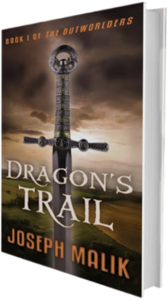In their eagerness to get published, and often their naiveté about the business world (let alone the publishing world), many authors hand over copious amounts of their hard-earned money from their day-jobs to vendors promising the world. The reality is that the book market is more competitive than ever. It’s hard for new authors to get noticed. It’s difficult to tell the good opportunities from the mediocre or downright misleading. As a creative person, it is damn frustrating to write and publish a stellar book that never even makes a dent in the market. While perhaps money isn’t the motivation behind their writing, authors at least need to sell enough so that they can afford to keep writing.
Deciding to Self-Publish
 When my husband, Joseph Malik, first told me of his plan to self-publish his debut novel Dragon’s Trail after a decade of rewrites and rejections, I encouraged him to put his work out there in the world. I knew he was brilliant of course, and that his writing was excellent – over fifteen years of marriage and thousands of dinner conversations I’ve learned a lot from him about language and writing. We share a love of well-crafted literary voices, as demonstrated by our habit of reading snippets to each other when our bedtime reading comes across a noteworthy turn of phrase.
When my husband, Joseph Malik, first told me of his plan to self-publish his debut novel Dragon’s Trail after a decade of rewrites and rejections, I encouraged him to put his work out there in the world. I knew he was brilliant of course, and that his writing was excellent – over fifteen years of marriage and thousands of dinner conversations I’ve learned a lot from him about language and writing. We share a love of well-crafted literary voices, as demonstrated by our habit of reading snippets to each other when our bedtime reading comes across a noteworthy turn of phrase.
But regardless of his talent as a writer, I was admittedly skeptical about the marketability and the financial prospects of a fantasy novel with a premise that could be interpreted as “camp” among serious readers. The big publishers felt the same way, it seems; although a major publisher held his book for over eighteen months, at one point requesting a 5-volume series treatment, they ultimately passed on it because they believed there was, simply, “no market for a realistic fantasy series.”
This was his baby, so I kept my hands off while he researched self-publishing and ultimately released his e-book exclusively through Amazon at a low-ball price alongside a paperback version through CreateSpace (Amazon’s print-on-demand company), and waited to see what happened.
And waited. And. Waited.
In the big scheme of things, it wasn’t a terrible debut. During its first 90 days it sold a couple hundred copies and had tens of thousands of page reads on Kindle, which was better than many indie authors can expect to achieve. He paid for a “blog tour” to get his name out there, which was a good first step to raise awareness, but after the 90-day mark had passed, it fell off the map and it looked like that was it.
Indie Book Marketing means becoming an Indie Publisher, not just an Indie Author
Fortunately, since we both work and weren’t depending on his book income to make a living, we decided to treat the book and the publishing company like a real business, reinvesting all of his book earnings in promotions and in the company. That decision ended up being the primary thing that changed the trajectory of Dragon’s Trail, and the course of his career as an independent author.
A major turning point came when he appeared as a panelist at a big regional Sci-fi/Fantasy convention. Since he was a panelist, an onsite bookstore offered to sell his books on consignment at the convention. It took a leap of faith to print up some inventory to sell, but it was too good an opportunity pass up.
Finding Your Audience
Joe made such an impression on his panels that weekend that he had a line out the door when he got to his signing table. Dragon’s Trail sold out, and the bookseller had to take orders. They soon became the first bookstore to stock Dragon’s Trail on their shelves.
That convention was the turning point that showed us who the audience was for his book. Here there was a room of people who not only wanted to read a realistic fantasy novel, they were clamoring for it and wondering what had taken so long.
The market was there, all along . . . the big publishers just didn’t have a clue where it was.
After the convention, my husband came home with an unexpected small windfall from book sales in his pocket, and additional revenues on the way from e-book orders (the convention spike boosted it up into the top 20 in the Military Fantasy category on Kindle).
Having more money to reinvest back into the business than he knew what to do with, my husband asked me to step in and officially take on Business Development for our publishing company, Oxblood Books. That seed money, and the insight we’d just received into our true market, was enough to start building the company for real.

Joseph Malik at the Oxblood Books booth at WorldCon 76.
Building your successes upon each other
Once we knew who the audience was for his book, we were able to figure out how to more effectively market it, and get it in front of readers who would be excited by it. We learned how to target our advertising to these readers who would come to embrace this funny, irreverent, genre-bending book that didn’t quite fit any existing mold. For every lesson learned, every step up that we took, we kept leveraging those new revenues into the next logical step, and then the next.
Eighteen months later, Dragon’s Trail has sold its ten-thousandth copy, become a Kindle Top 100 bestseller, received critical acclaim from Publishers Weekly, and has made Joseph Malik eligible for the 2019 John W. Campbell Award for Best New Writer . . . a tremendous (and possibly unprecedented) achievement for an independent debut novelist.
As a partner in the success of this debut novel, I discovered that the skills I gained during my fifteen year career with a Seattle IT firm, wearing many different hats (Finance Manager, Technical Editor, and Business Development Manager), gave me some valuable resources and insights. Publishing is a business just like any other. While the mainstream publishers viewed the book’s uniqueness as a potential liability, we found that it ended up being its biggest strength… after all, Marketing 101 covers differentiating yourself from your competitors.
Indie book marketing is not magic if you can match your product to your audience, and get it in front of the right people. It turns out that there are countless readers who will embrace and evangelize books that shatter their expectations. Oxblood Books has shattered expectations 10,000 times over, and with Joseph Malik’s second novel coming out next month, and other authors submitting unsolicited manuscripts for our consideration, we show no signs of slowing down.
Katie Malik is the CEO/Owner of Malik Creative Services. Are you an author (indie or trade published), looking for help marketing your book? Follow Katie on LinkedIn or send an email via the link below.


